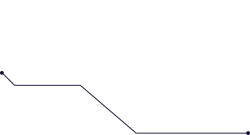Semantic Search With Intelligent Facets: Find and discover the most relevant datasets for your analysis using powerful semantic search with intelligent facets. Advanced keyword search with token matching finds the most relevant data assets, and semantic search is even applied to inferred data domains. Intelligent facets, based on the search results, allow users to narrow the search to the datasets of interest.
Holistic Relationship Discovery: Get a holistic view of data in a knowledge graph that lets you quickly search, discover, and
understand enterprise data and meaningful data relationships. Automatically discover related datasets, technical, business, semantic, and usage-based relationships. The holistic data view shows related datasets, tables, views, data domains, reports, and users. This aids in progressive discovery of other datasets of interest.
Automated Classifications With Intelligent Domain and Entity Recognition: Automatically classify and identify domains and entities such as customer, product, order etc. across all structured and unstructured data assets at the field, column, and table level. This is
a crucial step in the ability for companies to catalog, govern, and extract value from their data assets. This classified data enables better search, filtering of search results, and business glossary recommendations. Informatica provides over 60 packaged data domains such as email,
credit card number, social security number, country, city, URL, and company name. Users can add their own custom domains too. Data assets can be classified using data rules or column name rules.
Data Lineage and Impact Analysis: Interactively trace data origin through lineage views at any level—from business-friendly, systemlevel views that highlight the endpoints to granular views that include all the complex details in between. A drill-down lineage view expands any lineage path to show granular column- and metric-level lineage. Users can perform detailed impact analysis on upstream and downstream
data assets.
Collaboration and Social Curation: Informatica Enterprise Data Catalog empowers data analysts and data scientists to easily find the most relevant and trusted data for analytics by harnessing the combined power of AI and human expertise and collaboration. Data owners and subject matter experts can certify datasets. Data consumers can provide ratings and reviews for datasets enabling social curation of data.
Integrated Data Quality: View data profiling statistics, data quality rules, scorecards, and metric groups alongside technical metadata to understand the quality of data assets before using data for analysis.
Profiling statistics include value distributions, patterns, and data type and data domain inference.
Automatic Association of Business Glossary Terms: Informatica Enterprise Data Catalog allows for easy import of business glossary assets such as terms, policies, and classifications from Informatica AxonTM as well as third-party tools. Add rich business context to the data by automatically associating business terms with the right technical
metadata, eliminating a tedious manual process and allowing business and IT stewards to collaboratively manage business metadata that includes efficient human workflow automation.
Intelligent Data Similarity: Advanced statistical and machine learning algorithms identify similar data and subsets of data. This powerful capability helps users find the most relevant and trusted data they need. For example, a telecom analyst interested in customer churn analysis might query data containing pre-paid customer activity for the current quarter. Informatica Enterprise Data Catalog can recommend a cleaner version of the data (substitute data), data containing customer activity
for the previous quarter (union-able data), and a customer detail table to enrich the dataset.



